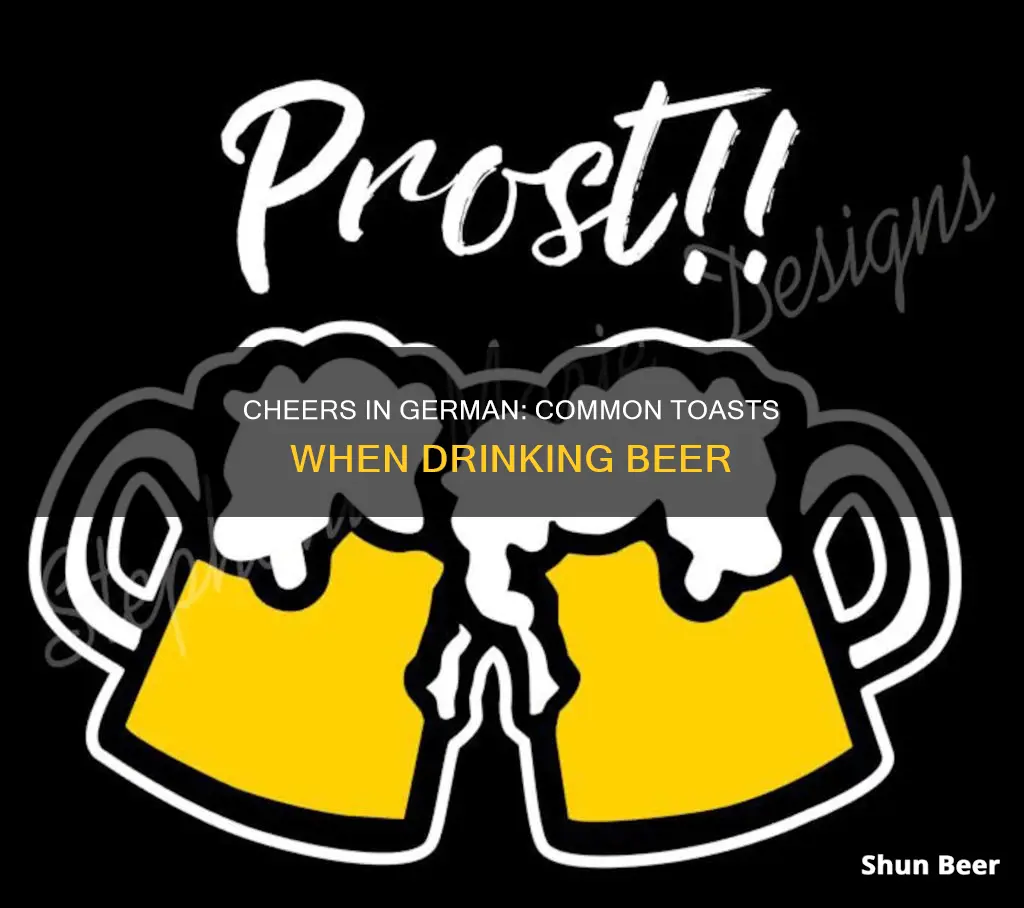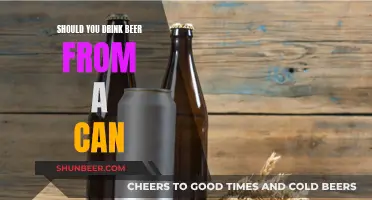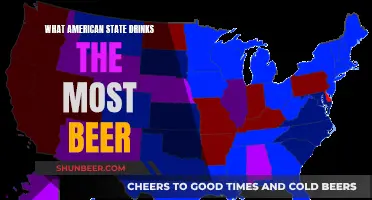
Drinking beer is a big part of German culture, and there are many traditions and phrases associated with it. One of the most well-known German toasts is prost, which is used in social drinking occasions and means to life or to health. Germans also have many rules of drinking etiquette, such as always toasting before taking a sip, clinking glasses with everyone in the group, and making sure to maintain eye contact. So, the next time you're drinking beer with Germans, remember to prost!
| Characteristics | Values |
|---|---|
| German toast | Ein Prosit |
| German cheer | Prost |
| Swiss-German cheer | Broscht |
| German toast for formal occasions | Zum Wohl |
| German toast for wine, schnapps, or spirits | Zum Wohl |
| German toast for health | Gesundheit |
| German toast for drinking rounds | Ich möchte einen Toast auf (NAME) ausbringen |
| German toast for encouragement | Lasst euch nicht lumpen, hoch mit dem Humpen |
| German countdown before drinking | Eins, zwei, drei |
| Bavarian drinking cry | Oans, zwoa, drei, g’suffa! |
| Bavarian drinking cry (English translation) | One, two, three, drink! |
| Announcement by the Mayor of Munich to start Oktoberfest | O'zapft is! |
| Bavarian word for a one-litre glass mug of beer | Maß |
| Bavarian word for drunk | Ogschdocha |
What You'll Learn

Prost is the German word for cheers
In Germany, the word "prost" is used to say "cheers" when drinking beer. It is one of the most well-known drinking toasts in the world, and it is an expression that means "to life" or "to health". The oldest brewery in the world is in Germany, so it is no surprise that "prost" is such a popular toast. When saying "prost", it is important to clink the bottom of your glass with others in the group and to make eye contact. This is considered part of the proper etiquette of using "prost".
"Prost" is also used as the name of many drinking establishments in the United States, such as Prost Brewing in Colorado and Prost Tavern in Seattle. Additionally, there is even a book entitled, "Prost! The Story of German Beer", written by Horst D. Dornbusch.
During Oktoberfest, the world's largest beer festival held annually in Munich, Germany, there are several other phrases that are commonly used. For example, "Oans, zwoa, drei, g'suffa!" means "one, two, three, drink!" and "O'zapft is!" means "it's tapped!". It is important to note that the Bavarian dialect, which is commonly spoken in Munich and southeastern Germany, sounds very different from Standard German.
When drinking beer in Germany, there are also some important etiquette rules to follow. Firstly, it is considered rude to start drinking before toasting. Secondly, toasting with water is considered bad luck, and it is believed that this will bring death upon the person you are toasting with and yourself. Thirdly, it is customary to take a few sips of your drink before putting your glass down. Lastly, when drinking wheat beer, it is important to pour it into a glass instead of drinking it from the bottle, as this improves the flavour profile.
Craft Beer Connoisseurship: Is Price Worth the Taste?
You may want to see also

Germans say Ein Prosit when singing cheers at Oktoberfest
When it comes to drinking beer, Germans have a variety of phrases to say "cheers". One of the most well-known is Prost, which is a common toast for any social drinking occasion. However, during Oktoberfest, there is another phrase that takes centre stage: "Ein Prosit".
"Ein Prosit" is a song that has become synonymous with the festival, being played by bands in the tents every 10 to 20 minutes. The song, whose title translates to "a toast", has simple lyrics that are easy to learn:
> Ein Prosit, ein Prosit
> Der Gemütlichkeit
> Ein Prosit, ein Prosit
> Der Gemütlichkeit
"Gemütlichkeit" is a uniquely German word with no direct English translation, but it represents a state of well-being, warmth, and friendliness, or "coziness" and "good cheer". So, the song is essentially a toast to good times and well-being.
After the band plays "Ein Prosit", everyone raises their glasses and sings:
> Oans, zwoa, drei, G'suffa!
This means "one, two, three, drink!" and is followed by the clinking of mugs and, of course, drinking. This is a mandatory part of the Oktoberfest experience, and the song is so integral to the festival that it has been described as "an Oktoberfest anthem".
The song was composed by Bernhard Dittrich (or Dietrich) in the 1800s and became an Oktoberfest staple in 1912. Interestingly, despite being so closely associated with the festival and Bavarian culture, the song did not originate in Munich or even Bavaria. Instead, it was composed in Chemnitz in the eastern state of Saxony.
Beer Drinking: Daily Habit's Impact on Your Health
You may want to see also

Oans, zwoa, drei, g’suffa! is a Bavarian drinking cry
"Oans, zwoa, drei, gsuffa!" is a Bavarian drinking cry, counting up to three before shouting "drink!". It is a phrase often yelled out at Oktoberfest, right before everyone clinks their glasses and takes a drink. The phrase is also used at other beer-drinking events, such as the annual Clayton Business and Community Association Oktoberfest.
The phrase is an example of the Bavarian dialect, which is spoken in Munich and much of southeastern Germany. Bavarian German sounds very different from Standard German, with many swallowed consonants and vowel sounds, simplified grammar, and unique vocabulary.
At Oktoberfest, "Oans, zwoa, drei, gsuffa!" is one of the most commonly heard phrases, along with "O'zapft is!", which is the iconic cry given by the Mayor of Munich when the ceremonial keg is tapped, marking the beginning of the two-week festival.
Other popular German drinking toasts include "Prost!", which is used for beer, and "Zum Wohl!", which is used for wine, schnapps, or spirits.
Drinking and Driving: Is it Ever Safe?
You may want to see also

Germans will toast with anything but water, which is considered bad luck
Germans take their beer seriously, and with that comes a set of rules and etiquette. One of the most important rules to remember when drinking with Germans is to always toast with eye contact. Failing to do so is considered rude and can have serious social consequences. According to superstition, not maintaining eye contact when toasting will result in seven years of bad sex. This superstition dates back to medieval times and has several possible origins. One theory suggests that it comes from the Viking Age, when warriors would maintain eye contact when clinking their drinking horns to ensure neither man was drawing a weapon. Another theory suggests that it was a way of showing trust and ensuring that no one had poisoned their drinking partner's beverage.
Another important rule of German drinking culture is to never toast with water. Toasting with water is considered bad luck and is even associated with death. According to an article in the Huffington Post, "proposing a toast to somebody with water is akin to wishing bad luck, and maybe even death, upon them. Many people also believe that by toasting with water, you are wishing death upon yourself, as the water reflects your future watery grave." So, if you're drinking with Germans, stick to toasting with beer, wine, or sparkling wine.
So, what do Germans say when toasting? The most common expression is "Prost!", which comes from the Latin "prosit", meaning "may it be good" or "may it be beneficial". "Prost" is the standard toast for beer, while "Zum Wohl" is typically used for wine, schnapps, or spirits. If you want to get a little fancier, you can use the full Latin form "Prosit", which is more sophisticated and commonly used for wine, champagne, or sparkling wine.
If you're celebrating Oktoberfest, you might sing "Ein Prosit, Ein Prosit [a toast, a toast] / der Gemütlichkeit [to cheer and good times]". This toast was written by Bernhard Dietrich in the 1800s and is often sung by crowds during Oktoberfest celebrations. So, the next time you raise a glass with Germans, remember to make eye contact, stick to toasting with beer or wine, and cheer "Prost!" or "Zum Wohl!".
Drinking Beer on the Road: What's the Law?
You may want to see also

Wies'n is the nickname for the place where Oktoberfest is held
Oktoberfest is an annual festival held in Munich, Bavaria, from mid- or late-September to the first Sunday in October. It is the world's largest folk festival, attracting more than seven million international and national visitors. The festival features a beer festival and a travelling carnival, with visitors enjoying amusement rides, side stalls, games, and traditional foods.
The first Oktoberfest took place in 1810 as part of the celebrations for the wedding of Crown Prince Ludwig, later King Ludwig I of Bavaria, and Princess Therese of Saxe-Hildburghausen. On 17 October, the five-day celebrations ended with a public horse race on a meadow between Munich and Sendling. The formerly nameless meadow below the Sendling hill was named "Theresens Wiese" (Therese's Meadow) in honour of the bride. Over time, this name was simplified to "Theresienwiese". As the meadow primarily served as the location for Oktoberfest, the name of the event and its location merged in the minds of the locals, who started referring to the festival as "Wiesn".
"Wiesn" is the colloquial name for the fairgrounds, Theresienwiese, and is how Munich locals refer to the festival. The name is derived from the German word "Wiese", meaning "meadow". So, when someone from Munich says they're going to the "Wiesn", they are literally saying they're going out to the meadow.
The Bavarian German dialect, which is quite different from Standard German, is commonly spoken in Munich and southeastern Germany. So, if you're visiting Oktoberfest and want to sound like a local, it's worth learning some Bavarian phrases. For example, "Prost!", which means "cheers", is a common toast at social drinking occasions. Other popular German toasts during Oktoberfest include "Ein Prosit" ("a toast") and "Zum Wohl" (used for wine, schnapps, or spirits).
Beer Choices of JR in Dallas: Exploring His Preferences
You may want to see also
Frequently asked questions
Germans say "Prost!" when cheering with beers, and "Zum Wohl!" when toasting with wine, schnapps, or spirits.
Other ways to say "cheers" in German include "Ein Prosit" and "Broscht" (the Swiss-German version).
Yes, Germans always toast before drinking with friends. They clink the bottom of their glasses, not the top, and always make eye contact. Toasting with water is considered bad luck.
Germany has many popular beer styles, including Pilsner, Oktoberfestbier, Hefeweizen, and Weizen.







